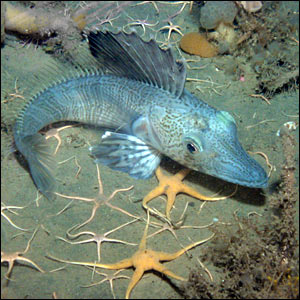
Have you heard about the amazing ice fish? One of the extraordinary evolutionary adaptations found in the extreme Antarctic cold is found in the ice fish. The fish has no red blood cells and no hemoglobin, so its blood plasma flows more freely. The oxygen that its muscles need simply dissolves in the plasma. [photo source: BBC News]
.
tags: ice fish, Antarctica
- Log in to post comments
More like this
Hemoglobin is a protein within mammalian red blood cells that transports oxygen for delivery to tissues throughout the body.
Antarctic icefish (Channichthyidae), like the crocodile icefish pictured above, are quite unique in being reportedly the only vertebrate that does not have circulating…
Image Source: The Goldfish Bowl: Canterbury Writers
Gills are to fish what lungs are to mammals. This is where gas exchange between the animal and the environment takes place. As water flows across the gills, oxygen is taken up into the blood of the fish and carbon dioxide is removed. In both…
With all the vaccination "skeptics" who've crawled out of the woodwork over the last couple of days in response to my two posts about Dawn Winkler, the Libertarian candidate for the Governor of Colorado who happens to be a rabid antivaccination activist, not to mention totally clueless and nasty…
Natural selection is not natural perfection. Time and again, biologists have discovered traits that are both beneficial and harmful. Perhaps the most famous example is the devastating disorder known as sickle-cell anemia. To get sickle-cell anemia, you have to inherit two faulty copies of a gene…



Have you heard about the amazing ice fish?
It's not just one fish - it's a whole family, Channichthyidae, with about 11 genera and 15 species.
I just heard about these things today - a commenter on my blog requested I look into them.
I've just been reading paper abstracts so far, but the short version is they have no red blood cells because the genes for haemoglobin and myoglobin have been deleted. There's some speculation that their current high-efficiency circulatory systems (larger blood vessels, higher pressures, etc) are partly a physiological (i.e. phenotypic plasticity) adaptation to reduced oxygen loads, based on comparisons with related fishes. One paper (by K-H Kock, 2005, I think) asserts that the loss of RBC has imposed a net cost on these fishes, and that this phenotype does not increase relative fitness. Somehow they've just managed to cope with lower tissue-oxygen concentrations.
Also, they're very, very pretty.
They are fascinating creatures and Dr. Sean B. Carroll gives a great description of the evolution of the icefish in his book "The Making of the Fittest". The history of the evolution is clearly written in the genes and most if not all of the steps in the process are clearly defined and are extremely convincing evidence of evolution. he covers the gene deletions as well as the mutations that enable the fish to make antifreeze.
The oxygen that its muscles need simply dissolves in the plasma.
Humans can do that too! It's the basis of hyperbaric oxygen therapy for carbon monoxide poisoning: see, for example, this BMJ article. That's pretty amazing too.
Let's not cause the cool brittle stars to feel left out. While at Sanibel Island, Florida, vacationing from high school,I ran my hands through the sediment in an inch or two of water by the shore and came up with live brittle stars. Now we know they have tiny calcite "eyes" in their arms, adding to their mysterious nature. I can't help wondering what it is like to "be" one of these invertebrates, if the question has any meaning at all. We are so chauvanistic about our top-predator position and misguided intellectual abilities that are enabling us to turn the world into a weed patch.
Cool fishes indeed. They can live in seawater that is colder than the freezing point of their own body fluids.